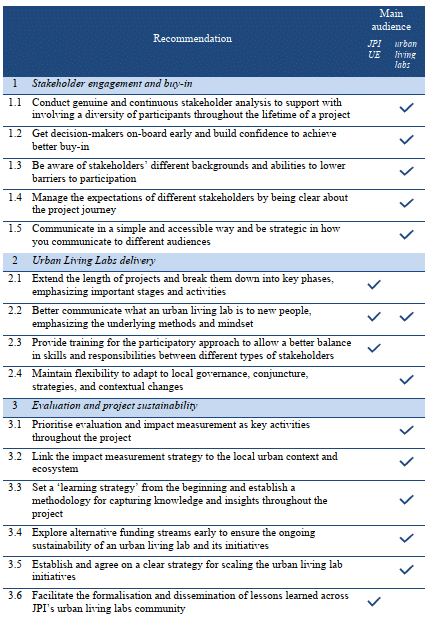Join JPI UE
Faq
FAQ
Please click here for the frequently asked questions we collected.
If you have an additional questions you are welcome to mail us at info@jpi-urbaneurope.eu
An urban living lab is an experimental approach to tackle complex urban issues. Labs involve a wide range of stakeholders and offers opportunities and a platform to develop ideas and solutions in everyday settings. Here, stakeholders are deeply and actively involved from the early stages of the project, and the research is by its design open for surprises and learning that originates from the stakeholders involved.
New collaborations are emerging in the form of urban living labs – sites devised to design, test and learn from social and technical innovation in real time.
– The Emerging Landscape of Urban Living Labs: Characteristics, Practices and Examples (2017)
There is a fear of experimentation and perceived failure within municipalities. They must demonstrate good value for public money which is something that makes it difficult to justify failed pilots or interventions- even if the learnings hold valuable insights that can support decision making. Success can be measured in how the community of an urban living lab grows during the project. This can indicate that they are open to welcome and involve new partners to tackle relevant issues and re-adjust when circumstances change.
There are often no tangible results visible and only publications or policy recommendations. However, that doesn’t mean there is no impact, and new relationships are also a clear outcome of urban living lab projects. In today’s modern, digital world, meeting spaces where you engage in problem solving together are rare, especially in something as concrete as your neighborhood. At the same time, we long for human connection and purpose. What (socio-economic) effects that activities like urban living labs can have in a wider societal and cultural context, is yet to be explored.
Nevertheless, aside from the social aspect and added value, Urban Living Labs are long-term projects that often rely on the next stage of funding to continue to develop. There are however many opportunities to integrate these projects and approaches within the local processes and initiatives. Either municipal, or civic.
We are convinced that the urban living lab approach can be integrated into numerous urban development processes and civic participation projects.
– an urban living lab partner
JPI Urban Europe has often throughout the years emphasized that it is not the term or label “urban living lab” per se that needs attention- but what it contains (participatory urbanism, experimentation, challenge-focused projects). As expressed by a city representative in one of the projects interviewed in the EXPAND programme: “I am not familiar with the concept of urban living lab. We do however do a lot of community leadership, and community panels.”
The starting point for the project was a matchmaking event from JPI Urban Europe. It is there that the main partners met and then started reaching out to other partners
– Project interview
According to results in the EXPAND report, Urban Living Lab projects highlighted and openly spoke about issues that were kept quiet in local communities.
The team in EXPAND II developed 15 recommendations and clustered them into three categories:
